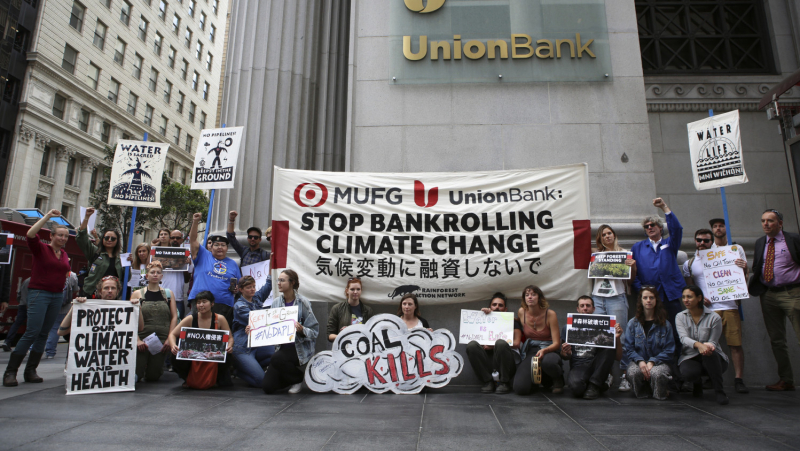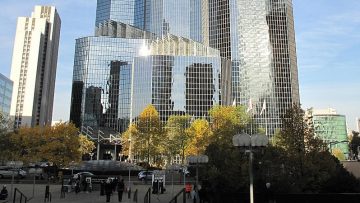Mitsubishi UFJ Financial Group distances itself from the East African Crude Oil Pipeline

The StopEACOP coalition welcomes the news that Japan’s Mitsubishi UFJ Financial Group (MUFG) is not involved in financing the East African Crude Oil Pipeline (EACOP). The controversial EACOP project has been a subject of deepening concerns due to its implications on the climate, nature and human rights. This response from MUFG results from concerted efforts by regional and global climate activists who are members of the StopEACOP coalition.
Responding to questions from 350 Japan, MUFG noted the exceptional circumstances that required the bank to comment on the situation. The bank said: “We refrain from commenting on individual transactions, even if we are not involved in, or have ruled out, the financing of a project. However, given the unique level of interest in EACOP, on an exceptional basis, we can confirm that we are not involved in its financing.”
MUFG’s announcement follows the withdrawal of another Japanese bank, Sumitomo Mitsui Financial Group (SMBC Group), which like MUFG, has been a major financier to TotalEnergies, the main shareholder of the planned controversial pipeline.
MUFG attributed its response to the exceptionally high level of interest in the EACOP project, which can be credited to the dedicated efforts of activists from the StopEACOP coalition, 350 Japan and other campaigners from Japan to Uganda and Tanzania.
The proposed EACOP pipeline will be the world's largest heated crude oil pipeline, beginning at Hoima in Uganda and terminating in Tanga Port in Tanzania, spanning 1,443 kilometers. However, the project has sparked controversy due to its potential contributions to climate change and human rights abuses, including loss of livelihood by the frontline communities.
"MUFG has been a long-standing supporter of Total. For them to confirm non-involvement in EACOP is a significant development. It further elucidates this project’s problematic and harmful nature and the risks involved for any institutions that would back it. While we welcome this announcement, we are concerned that banks like Standard Bank remain stubborn in supporting this project. We hope that this announcement will make Standard Bank realize its need to denounce its current position and withdraw support for EACOP", said Zaki Mamdoo, StopEACOP Campaign Coordinator.
"This response by MUFG is good news for the citizens of Africa, Japan, and the world. With this news, all three Japanese megabanks distanced themselves from the East Africa Crude Oil Pipeline (EACOP), which threatens the people and nature of Africa and could result in annual emissions of up to 34 million tons of CO2. The Japanese government and private sectors should support the energy of the future, renewable energy, not the energy of the past, fossil fuels", said Masayoshi Iyoda, 350.org Japan Interim Team Lead.
"MUFG's decision to rule out financing EACOP, acknowledges the project’s devastating social, economic, and environmental impacts in Uganda. This decision sends a powerful message to the financial sector and the world, emphasizing the importance of prioritizing people and the planet over short-term gains. It serves as a reminder that true progress lies in fostering development that respects the well-being of communities, safeguards ecosystems, and contributes to a sustainable future for all", said Charity Migwi, Africa Regional Campaigner 350 Africa.
“MUFG following its Japanese peers and abandoning the EACOP should be a stark warning to Chinese lenders considering supporting the project. Banks including ICBC, which is still a financial advisor to EACOP, as well as China Exim Bank, should take their lead from Xi Jinping’s promise to give priority to environmental protection and become true green leaders. This can only mean following the example of their Japanese peers and ruling out any involvement or financing of this dangerous and incredibly risky project”, said Henrieke Butijn, Climate Campaigner and Researcher, BankTrack.
Notes to Editors:
#StopEACOP is a global campaign against the construction of the East African Crude Oil pipeline (EACOP), a proposed 1,443-kilometer heated pipeline that will transport oil from Hoima, Uganda, to the port of Tanga in Tanzania. An alliance of local groups, communities, and African and global organisations leads the campaign. The #StopEACOP Coalition calls for a stop to the proposed pipeline and associated oil fields at Tilenga and Kingfisher. The #StopEACOP campaign is gathering momentum, building pressure on the remaining supporters and financiers of the East African Crude Oil Pipeline. So far, 27 major banks and 23 major (re)insurers have ruled out support for the pipeline. Some financial institutions yet to commit to not funding EACOP include Standard Bank, AIG, and ICBC.


